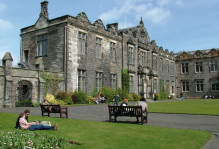Learning English at Two of the Most Historic Universities in the English-Speaking World
In this last installment of the St. Andrews W&M Joint Degree Program blogs (previously we’ve discussed the History, International Relations, and Economics Programs) we’ll discuss the discipline which at first glance might make the most sense to study in these two countries sharing a common language: English Literature and Language. The same structural differences exist between the English departments at both schools as they do in the other programs: at the W&M English Department offers students a broad based interdisciplinary approach to the study of English literature and language whereas the St Andrews curriculum is progressive and focused. Likewise, the same perks exist for Joint Degree students studying English as they do for those studying in the other three disciplines: a mentored experience with an academic advisor, priority placement in popular courses, developing intellectually with a challenging cohort of both institutions’ best and brightest and experiencing a highly unique cross-cultural exchange.
The W&M English Department offers an assortment of courses ranging from the traditional foundations of English literature to more modern and experimental works. Typical W&M English students develop an understanding for the historical, rhetorical, cultural and philosophical study of language by taking courses either offered only in the English department or cross-listed with other departments such as Women’s Studies, Africana Studies or American Studies to name a few. Outside the more traditional study of language and literature, the department offers a varied and extensive program for creative and expository writing. Since 1971, the Donaldson Writers in Residence and the Hayes Writers Series have brought many interesting and distinguished authors, poets and playwrights to campus to inspire and instruct the College’s students. These various avenues for intellectual development and exploration within the realm of English literature provide students with an interdisciplinary approach to this long studied discipline.
If you have read my previous blogs, you might have already anticipated that St Andrews’ English program is significantly more focused and allows for less flexibility in experiencing courses outside the traditional English literature structure than W&M’s liberal arts curriculum. However, this emphasis on literature via time periods and single-author study supports a very large catalog of varied and exciting course options. With choices such as Scottish poets, authors such as T.S. Eliot, topics on Science Fiction novels, and even a class entitled “Literature and Ecology,” students choose from a vast assortment of courses which are generally not available in a single English department. While some of the English Honours Modules are offered in our familiar lecture style, many offer the option of small group tutorials with professors alongside significant independent study. In this respect, the UK system (as seen especially in the English Program) rewards independent thought and provides students with the freedom of autonomous scholarly progress.
The combined efforts of W&M’s emphasis on different approaches to the cultural values reflected in literature, and St Andrews’ focus on literary periods, require students to have an even better balanced and richer understanding of the development and progression of English literature. Students will develop deeper and more refined analytical skills via experiencing the different styles of analysis at both institutions, taking advantage of many more course options than exist at their home institution, learning in juxtaposed instructional styles and evolving intellectually with a cohort of highly intelligent and driven individuals. Expanding one’s world perspective is one of the many reasons to embark on a study abroad experience. Expanding one’s post-graduation options, one’s analytical development, one’s scholarly research skills and one’s passion for learning are just a few of the reasons to embark on an unparalleled four-year experience of a life time.
Contributed by:
Amanda Norris ’07
Former Assistant Dean of Admission
Comments are closed on posts older than one year, but we still want to hear from you. If you have a comment or question for us, please email admission@wm.edu.


This program sounds amazing and really is a dream opportunity for anyone who is serious about studying English Literature and Language!
Selin,
Glad you’re excited about the program. So are we.
Amanda
I can’t wait to apply! It’s the perfect balance of the ways to go about studying literature.
how many students are admitted to this program ? How many start at st andrews and go to wm and mary second year etc
@beth long, we generally admit about 1/3 of those who apply. It varies a bit by program but that’s a good rough estimate. The goal is for 20 students (5 per program) to start at W&M and for 20 students (5 per program) to start at St Andrews each year. All students change schools for their second year.